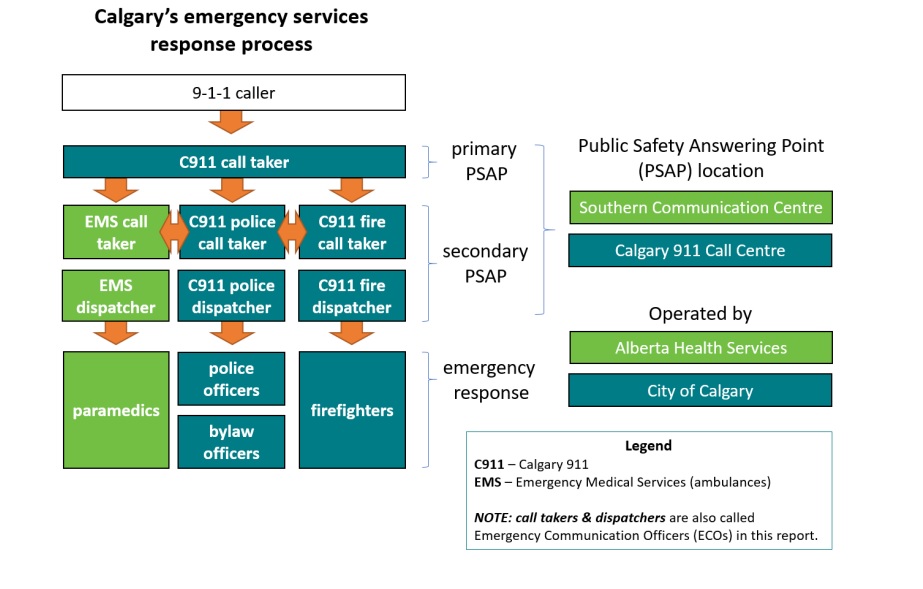When an individual dials 9-1-1, they are usually in the grips of a calamitous situation, often fearful, panicked, and grief-stricken. Little thought is given in such circumstances as to who the person might be on the other side of that call.
However, those who do answer the call, both literally and figuratively are being celebrated this week as part of National Public Safety Telecommunicators Week. While the majority of the public does not see the rapid-fire chain of events that occurs when someone answers their call for help, Discover Airdrie spoke to a local Public Safety Telecommunicator to better understand the world behind 9-1-1 calls.
P., whose full name is not being disclosed to protect their privacy, is an Emergency Communications Officer. (ECO). They have been in their role for a little over a year, though the world of the first response is not unknown to them as their entire family is in the first responder industry, including their spouse, while one of their children is in the Canadian military.
P., explained that once a 9-1-1 is placed a series of cascading events occur at a lightning-fast speed.
 A graphic shows what happens when a 9-1-1 call within the Calgary area is placed by a member of the public. (Graphic provided by Health Quality Council of Alberta)
A graphic shows what happens when a 9-1-1 call within the Calgary area is placed by a member of the public. (Graphic provided by Health Quality Council of Alberta)Originally P. contemplated joining the RCMP, but it turned out that 2016 became a pivotal moment in their lives. It had been a particularly dry spring in 2016 and all that came to a disastrous head when the wildfire broke out in Northern Alberta in Horse River. That fire would continue to rage on, becoming infamously known as the Fort McMurray wildfires. This event solidified his decision as to which first response branch they would choose.
While the work is not suited to everyone, P., said that there is something to be said for those choosing the work seeing it as more of a calling than a job.
"[Those working in this] truly have the compassion and have the ability to listen and really want to help," they said.
However, if one were to think that the world of ECO is repetitive, P., stressed that the learning evolution never ceases and that those who go into the line of work must be prepared to always be willing to learn, adapt, and always be ready to think on their feet - because after all - someone's health, well-being, and even life may depend on it.
"When someone is preparing themselves to get into this role, they have to be open to discussion, constructive criticism, ongoing learning, and to be able to compartmentalize," P., said. "[Compartmentalize] that it's not their emergency, but in that snapshot time, being able to wrap that all up, front to back; and when the call is finished, you move on to the next one."
Since their time in the role, there have been many calls, too many to quantify. However, there is one call that continues to replay in their minds. P., who identifies as Métis was able to use his command of the Cree language during one particular 9-1-1 incident.
An individual had called, visibly shaken after their uncle had collapsed in front of them. The young person was distressed and feeling helpless.
"Finally, I just had to take a step and I said, 'What's your name?' And he told me his name and I said they could call me nohcâwîs (no-chu)."
The word nohcâwîs in the Cree language is an informal term that is used for uncle.
"I wanted to see if he could just snap out of the moment and [know that] the person that he's talking to on the other end of the line is somebody that understands what it is that he's going through, but it's also able to connect with him in a way that most folks would not have been able to," P. said.
That brief exchange calmed that young person down and at the end of the phone call, something else happened, something that P., carries with him to this day.
"He said, 'Thank you, uncle, you saved my uncle.' It connected with me in a way that I wasn't expecting."
National Public Safety Telecommunicators Week is celebrated annually during the second week of April. Its origins date back to 1981 in California.
Send your news tips, story ideas, pictures, and videos to news@discoverairdrie.com





